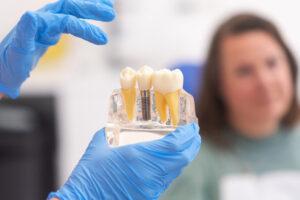Why Do My Dental Implants Hurt When I Chew?

Dental implants are excellent if you want to replace missing teeth, offering durability and a natural look. However, some patients experience discomfort when chewing with their implants. If you’re wondering, “Why do my dental implants hurt when I chew?” you’re not alone. This article will delve into common causes, solutions, and when to seek help from a dentist in Toronto.
What Are Dental Implants?
Q: What exactly are dental implants?
A: You could look at dental implants as titanium tooth roots, surgically placed into your jawbone to support replacement teeth. They are popular because they look, feel, and function like natural teeth. Over time, the bone grows around the implant, securing it firmly in place.
Why Do Dental Implants Hurt When Chewing?

Q: Why might dental implants hurt when chewing?
A: Several factors can contribute to discomfort when chewing with dental implants. Let’s explore some common causes:
Implant Infection
Q: Can an infection cause my dental implant to hurt?
A: Yes, an infection around the implant site, known as peri-implantitis, can cause pain. Symptoms include swelling, redness, and pus. You can prevent infection if you practice good oral hygiene and regularly see your Toronto dentist.
Poor Implant Placement
Q: Could the placement of my implant be causing the pain?
A: Improper placement can lead to pressure points that cause pain when chewing. An experienced dentist in Toronto ensures precise placement to avoid such issues.
Bone Loss
Q: Does bone loss affect my implant?
A: Yes, bone loss around the implant can lead to instability and discomfort. Bone grafts might be necessary before implant placement to ensure a solid foundation.
Nerve Damage
Q: Can nerve damage be a reason for pain?
A: Although rare, nerve damage during implant surgery can cause persistent pain. If you experience numbness or tingling, contact your Toronto dentist immediately.
Solutions and Relief
Q: What can I do to alleviate the pain?
A: Here are some steps you can take to find relief:
Professional Assessment
Q: Should I see my dentist if I experience pain?
A: Absolutely! Your dentist can diagnose the cause of your discomfort and recommend appropriate treatment. Regular visits to a Toronto dentist are crucial for maintaining implant health.
Oral Hygiene
Q: How does oral hygiene affect my implants?
A: Maintaining good oral hygiene helps prevent infections and inflammation. Brush twice daily, floss regularly, and use an antibacterial mouthwash.
Soft Foods
Q: Should I adjust my diet?
A: Yes, temporarily switching to soft foods can reduce pressure on your implants, giving the area time to heal.
Pain Relief
Q: Are there any immediate pain relief options?
A: Over-the-counter pain relievers like ibuprofen can help manage pain and inflammation. However, consult your dentist before taking any medication.
Long-Term Care for Dental Implants
Q: How can I ensure my implants last?
A: Long-term success of dental implants requires diligent care:
Regular Dental Visits
Q: How often should I visit my dentist?
A: Regular check-ups with your Toronto dentist every six months help monitor implant health and address any issues early.
Avoid Hard Foods
Q: Should I avoid certain foods?
A: Yes, avoid biting hard foods like ice or nuts, which can damage your implants.
Quit Smoking
Q: Does smoking affect my implants?
A: Smoking impairs healing and increases the risk of implant failure. Quitting smoking can significantly improve your oral health.
Preventive Measures for Dental Implant Health

Eat a Balanced Diet
Q: Can my diet influence the health of my dental implants?
A: Absolutely! A balanced diet rich in vitamins and minerals supports overall oral health. Foods high in calcium and vitamin D, such as dairy products, leafy greens, and fish, promote strong bones and gums.
Manage Stress
Q: Can stress affect my dental implants?
A: Stress can lead to habits like teeth grinding (bruxism), which can damage implants. Managing stress through relaxation techniques and using a nightguard if you grind your teeth can protect your implants.
Limit Alcohol Consumption
Q: How does alcohol affect my dental implants?
A: Excessive alcohol consumption can impair healing and increase the risk of gum disease. Moderating alcohol intake supports better oral and overall health.
Stay Hydrated
Q: Is hydration important for my oral health?
A: Staying hydrated helps maintain a healthy saliva flow, neutralize acids, wash away food particles, and reduce the risk of infections around your implants.
Regular Exercise
Q: Can exercise benefit my dental implants?
A: Regular exercise improves overall health, including your oral health. Exercise enhances blood circulation, supporting healthy gums and bones around your implants.
Wear a Mouthguard
Q: Should I wear a mouthguard if I play sports?
A: Yes, wearing a mouthguard during sports protects your dental implants from impact and injury.
When to Seek Immediate Help
Q: When should I seek immediate dental care?
A: If you experience severe pain, swelling, fever, or signs of infection, contact your Toronto dentist immediately. Prompt treatment can prevent complications.
Clinton Dental, Your Trusted Dental Implants Partner

In conclusion, understanding why your dental implants hurt when you chew is the first step toward finding relief. Regular dental visits, good oral hygiene, and following your dentist’s advice are key to maintaining healthy implants. If you have concerns, don’t hesitate to consult your dentist in Toronto.
Get Back to Smiling, Pain-Free
If you’re experiencing discomfort with your dental implants or have any concerns, reach out to Clinton Dental, your trusted Toronto dentist. We’re here to help you smile comfortably and confidently. Schedule your appointment today!






